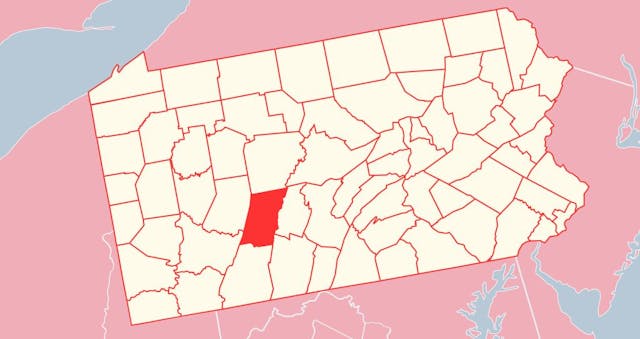Rehabs in Cambria
Cambria County is situated in the state of Pennsylvania in the US. It was founded on November 2, 1807. Ebensburg city is its county seat. According to the 2020 census, its population was 133,472, decreasing yearly by 74%-76% from 2016-2022.
As of the University of Wisconsin Population Health Institute research, this province ranks one of the minor healthy regions in PA. It has registered 50 deaths from opioids during 2018-2020. Besides, 20% of residents misused alcohol in 2019.
Although residents have abused substances quite a bit, Cambria County rehabs are doing their best to reduce the risks at least somewhat.
Drug and Alcohol Misuse Level Evaluation
First, all medical centers conduct an evaluation. It helps professionals understand whether the patient's level of addiction is appropriate for the services they provide. It includes the medical and clinical assessment of substance use disorder (SUD).
Therefore, the medical team diagnoses the health issues of a person. Besides, psychologists assess their co-occurring mental health. After all, doctors will decide the right treatment program an individual should attend.
Rehab Programs in Cambria County
Rehabs in Cambria County offer different programs and healing methods. They serve everyone regardless of their ability to pay. Their goal is to create a healthy life for residents without drugs and alcohol.
Detox
Residential treatment for substance addiction or abuse demands several stages. Essentially, any level starts with detox, leading to the main cure. Addiction doctors, nurses, and other specialists in this field monitor and care for patients 24 hours a day. By using certain medicines, they help to get rid of the toxins in their organism and complete the process as safely as possible. Only after that can the individual receive inpatient or outpatient care.
Inpatient Program (IP)
The inpatient program or residential care allows people to live on-site. At first, it provides the best treatment plan and creates a good environment. Here each person can show their personality and get helpful feedback from staff to change addictive behavior.
Then, people struggling with addiction and enrolled in inpatient programs can interact with each other in a way that makes it easy for them to experience "real-life" problems and learn how to conduct them. People need to take responsibility for what they do and are encouraged to help and be honest with each other in optimistic paths.
Peniel is a non-profit rehabilitation center for men and women aged 18 or more. They provide an environment where clients can grow and rebuild their substance-free lives.
General (GOP) and Intensive Outpatient (IOP) Programs
General outpatient programs and intensive outpatient programs are flexible substance abuse care options that take place two and three days weekly, permitting members to continue their ordinary life.
Here, therapists and counselors tailor a healing plan to a person's specific needs. They find out the nature of each patient and what causes them abuse. Then, doctors create a therapy plan that gives them the best chance of healing and getting better.
Besides, they keep track of people progress and make changes to their schedule as they learn and grow. Experts focus on individuals' strengths and help them regain their inner spirit. Thus, participants become able to be back to real life free from substance addiction or abuse.
To attend any level of OPs, people can turn to the Alliance Medical Services center. In this province, they offer OP and IOP programs.
Payment Options
If someone has financial problems covering their medical expenses of themselves or their loved ones, it is not a problem in this province. There are many addiction centers here that do not leave anyone without recovery. They meet and provide all possible means so that everyone, without exception, receives appropriate treatment.
At first, they accept both in-network and out-of-network health insurance plans such as Medicaid, Medicare, or Tricare. Yet, if one does not have coverage, clinics create financial plans based on the individual's ability to pay․
Forcing Teens Into Rehabilitation
Nowadays, rehab centers and clinics have specialty services for teens. Actually, according to Pennsylvania law parents or legal guardians have the right to compel the teens into rehab. However, if they enroll in a family support program there will be no need for force. Specialists have created different programs to support both teens and their families. Moreover, minors don't need to attend addiction centers as some of the projects are implemented in schools and communities.

